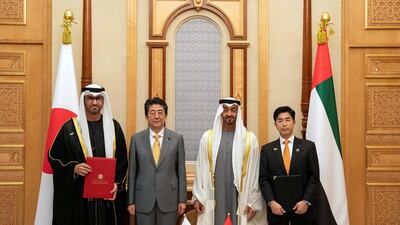Abu Dhabi National Oil Company renewed and expanded a strategic agreement with Japan that will allow the state-controlled energy producer to store and trade crude in Asia’s second-biggest economy.
The agreement enhances a previous deal, which expired at the end of 2019. Under the terms of the new pact, which has an initial three-year period, Adnoc will store more than 8 million barrels of crude oil at storage facilities in Japan, which could be traded while ensuring certain quantities of crude remains available in the event of an oil shortage in Japan, Adnoc said in a statement on Tuesday.
The new agreement “positively contributes to Japanese energy security, while also supporting Adnoc’s broader trading ambitions,” said Dr Sultan Al Jaber UAE Minister of State and Adnoc Group chief executive. Japan is Adnoc’s largest international importer of oil and gas products with approximately 25 per cent of its crude oil imported from the UAE.
The storage pact was signed on Monday during Japanese Prime Minister Shinzo Abe’s visit to the UAE, where he also met Sheikh Mohamed bin Zayed, Crown Prince of Abu Dhabi and Deputy Supreme Commander of the UAE Armed Forces.
“The Joint Oil Storage Project is a most symbolic and mutually beneficial project for both countries and will contribute to the improvement of Japan’s energy security as well as the UAE’s access to Asian markets,” said Makihara Hideki, Japan’s State Minister of Economy, Trade and Industry. “Given the current world geopolitical situation, it [the deal] is well-timed.”
Adnoc is pursuing its ambitious vision and 2030 strategy to grow its presence across the energy value chain and secure greater market access for its products by forging partnerships. The UAE accounts for 4 per cent of global crude production, much of it from fields owned and operated by Adnoc in Abu Dhabi. The national oil company is on track to reach 4 million barrels per day of production capacity this year as it looks to increase output capacity to 5 million bpd over the next decade.
Adnoc has a long history of strategic partnerships with Japanese oil and gas companies, which spans more than four decades, covering the entire oil and gas value chain.
As part of its 2030 smart growth strategy, Adnoc in recent years has also awarded concessions to Japanese oil and gas companies in the UAE. In 2015, Japan’s Inpex Corporation was awarded a 5 per cent stake in the Abu Dhabi Onshore Concession. In 2018, the Japanese firm took a 10 per cent stake in the new Lower Zakum offshore concession and at the same time, extended its 40 per cent stake in Satah and also increased its stake in Umm Al Dalkh from 12 per cent to 40 per cent. Last year, Adnoc awarded the exploration rights for Abu Dhabi Onshore Block 4 to Inpex.
In November 2019, Intercontinental Exchange announced Inpex and and JXTG along with eight of the world’s largest energy traders including Adnoc partnered with ICE to launch the ICE Futures Abu Dhabi, a new exchange that hosts the world’s first Murban crude oil futures contract.
Both the UAE and Japan have continued to strengthen their bilateral economic relations since 1961 when the first shipment of UAE crude oil was exported from Umm al-Shaif offshore field in Abu Dhabi to Japan. Trade between the two countries has grown with exports from Japan to the UAE climbing to about $7.9 billion (Dh29bn), while imports from the UAE were $27.5bn in 2018.











